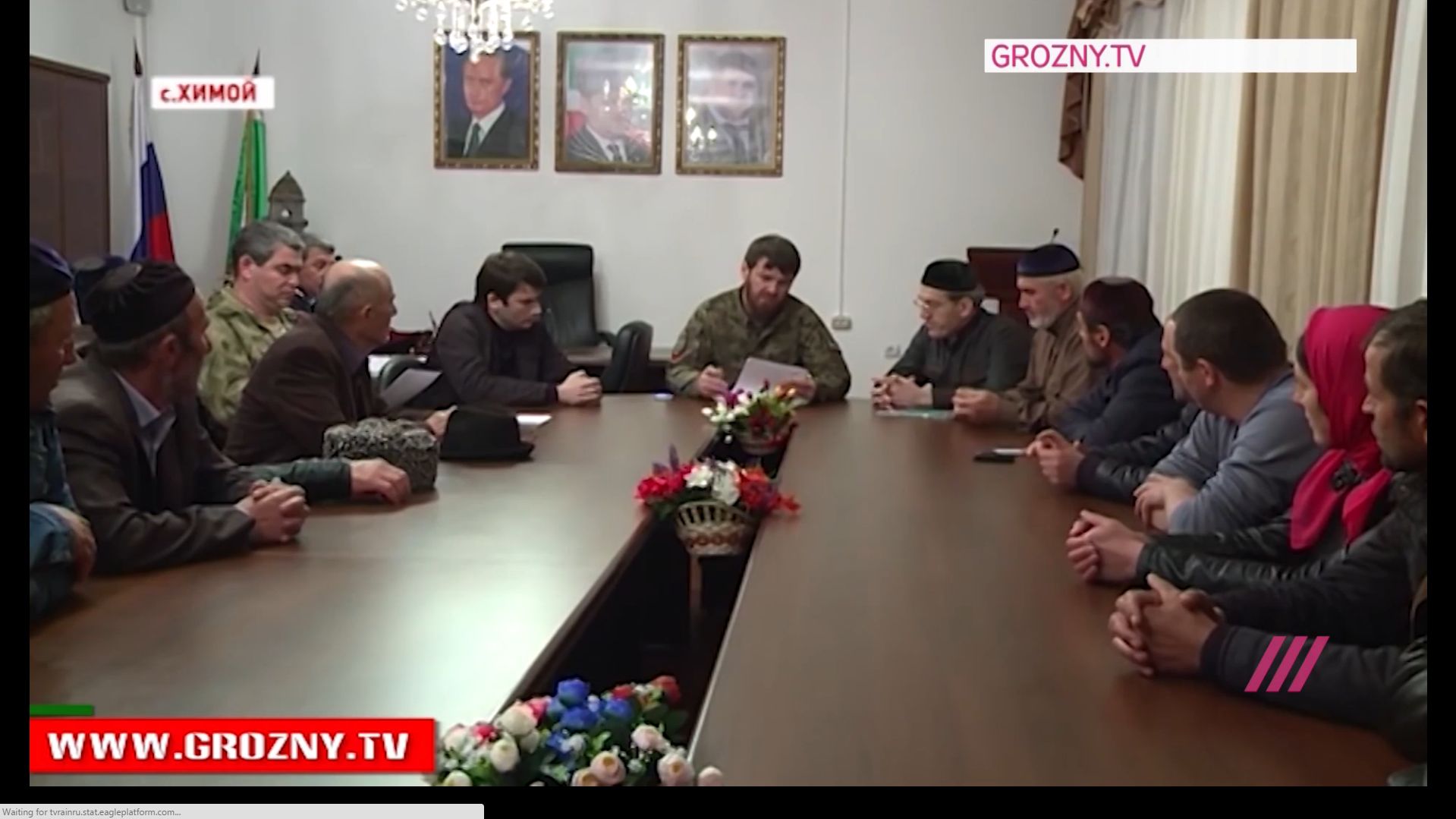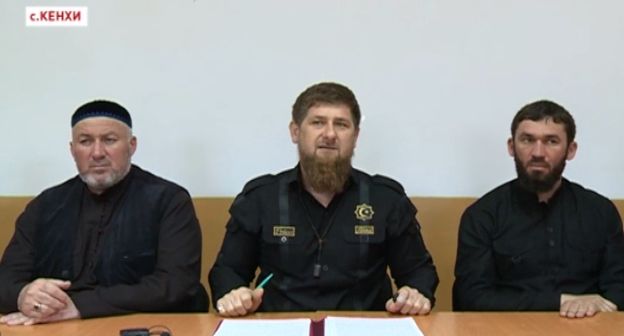LIVE UPDATES: After making a video appeal, condemning the Chechen authorities for misappropriating funds and failing to rebuild his war-torn village, Ramazan Dzhalaldinov was forced to flee the republic and his home has now been torched.
Welcome to our column, Russia Update, where we will be closely following day-to-day developments in Russia, including the Russian government’s foreign and domestic policies.
The previous issue is here.
Recent Analysis and Translations:
– Does it Matter if the Russian Opposition Stays United?
– Russian Foreign Minister Lavrov Has Invented A Version Of History To Meet His Needs
– Getting The News From Chechnya – The Crackdown On Free Press You May Have Missed
– Aurangzeb, Putin, Realism and a Lesson from History
UPDATES BELOW
With the dismissal of RBC’s editors and threats against other independent media, today felt like an unlucky “Friday the 13th” for Russia, as a number of Russian bloggers have said.
Lentach is a Twitter account made by the former journalists of Lenta.ru, whose editor-in-chief, Galina Timchenko was fired after publishing an interview with Ukranian former ultranationalist Right Sector leader Dmytro Yarosh. She and a number of the journalists who quit in protest went to Riga, Latvia, and formed Meduza, an independent news site in Russian and English with reporters inside Russia covering events there.
Translation: Friday the 13th in Russia
Lentach then listed the ominous headlines for today, spelling not only a crackdown on media and the Internet but the opposition and indeed any critics of the regime:
– Runet Will Be Entirely Segregated by 2020
(Runet is the Russian and Russian-language Internet, which the Kremlin hopes to sequester from the pernicious influences of the Western Internet.
– Navalny Questioned Re: Involvement in ISIS
(Anti-corruption campaign Alexey Navalny focuses only on domestic corruption issues and is unrelated to ISIS in any way, so it seems an absurd pretext.)
– Chernovik: Home of Local resident Who Complained to Putin About Kadyrov Burned in Chechen Village of Kenkhi
(Chernovik is a regional independent paper which had reported on the revenge unleashed on this critic. Presidential spokesman Dmitry Peskov claimed there was no basis to the story, and it would be too hard to haul barrels of oil up to this mountainous location such as to torch a home. In fact, Novaya Gazeta supplied pictures and reports from villagers and relatives confirming the incident.
– Roskomnadzor May Gain Right to Turn Off Sites Before Trial
(Roskomnadzor is the state censor which under law, can request to have sites turned off which should be reviewed by a judge.)
– State Duma Supports Restriction on Departure from Russia
(The right to leave and return from Russia freely was a hard-won right that Russians gained with the collapse of the Soviet Union, but it has recently become restricted for various categories of people. When opposition activists have criminal cases fabricated against them, the first thing to happen is that they lose the right to travel abroad.)
For Russia-watchers on Twitter, there was a wake for the RBC that once was, as the news traveled that articles now have to be cleared by the general manager — himself the subject of a criminal investigation now.
On Facebook, RBC published a list of what they considered their best investigative work during the tenure of Osetinskaya, (translation by The Interpreter):
– What’s Behind the Expansion of MGU
(On Katerina Tikhonova, the woman said to be Putin’s daughter).
– Who is Building the Shamalov Family’s Business
(On Kirill Shamalov, husband of Katerina Tikhonova, said to be Putin’s son-in-law, and his family.
– On What Money is Vladimir Putin’s Popular Front Living On?
(Investigation into Putin’s new vehicle for elections, now that United Russia and various Kremlin-created youth groups have been discredited.)
– How the Friends of the President and Mayor of Moscow Got Involved in Oil
– Where are the Russian Federation Soldiers in Ukraine From?
– How Much is Russia Spending on the War in Syria
– Building BAM: Who, What, and Why
(On reconstruction of the Baikal-Amur Mainline, a Soviet-era highway project, and its relationship to Vladimir Yakunin, former head of Russian Railways).
– What Russian Trade Unions Are Living On
– Who is Making Money from Building the Moscow Metro
– Who is Making Money on the Vostochny Cosmodrome and How
– How the Battle Against Corruption in Russia is Structured
– On Whose Cash is the Donbass Living
– On What the Church Lives On
– Who Owns Street Trade in Moscow
In their “obituary” for RBC, Slon.ru mentioned these same top hits and added a few more:
– Who is Making Money on the Repair of Moscow’s Roads
– Who is Making Money on the Reconstruction of Moscow
– How the Higher Economics School Earns Money
In short, RBC’s willingness to look critically behind Kremlin rhetoric and probe how the elements of Putin’s state are constructed and funded, not fearing even investigation of Putin’s family and cronies ultimately led to dismissal of their editors.
Kirll Martynov writes in Novaya Gazeta of the “hybrid war against the media,” borrowing the term used about Russia’s combination of covert and overt warfare in Ukraine. He notes that the authorities try to convince journalists that no one is interfering in the media and it’s all just a series of coincidences — the searches at RBC’s owner, ONEKSIM, the criminal case against the management, and finally the dismissal of the editors”
“Aleksei Volin, deputy head of the Ministry of Communications said as much: there is no political agenda here, it’s not worth even looking for one.
The tactics in fact are familiar and have been assimilated by the speakers who made official commentary regarding Crimea, and then Donetsk, where, as we know, there were only self-defense forces. If Trotsky had the slogan ‘neither peace nor war but a bayonet in the ground,’ then today, it’s like this: ‘We aren’t involved, and for your own welfare you must believe in this.’ The readiness to believe is part of the possible deal guaranteeing that you yourself will not be the object of a hybrid interest.”
The fear is that the few other remaining news outlets will be targeted next.
Elizaveta Antonova, a correspondent from the politics department of RBC, wrote on her Facebook:
“I feel a great love and gratitude. I am happy that I was a part of this. I dreamed of landing here, and tried to get in for a long time. Then I sat across from [politics department head Maksim] Glikin and from time to time would think ‘wow, am I really here, what fortune this is.’ Badanin, Osetinskaya and Solyus are fired. What will be next is totally understandable. The politics department will work until the first piece removed.”
— Catherine A. Fitzpatrick


Remaining 'RBC' editors will need to clear their stories with the general director – Meduza
The remaining editors at the independent news company RBC will be required to get prior approval from the organization's general director, Nikolai Molibog, for all news stories, according to Meduza's sources. Staff at RBC's politics desk say they're prepared to keep working "until the first story is taken down."
Now, after deployment of elements of an anti-missile system [NATO in Europe], we are forced to think about how to clip threats emerging regarding the security of the Russian Federation.
Recent events indicate that the situation is not getting better. Unfortunately, it is getting worse, meaning now the introduction of the radar stations in Romania as one of the elements of a prospective USA anti-missile defense.
The US says the Aegis system is a shield to protect Nato countries from short and medium-range missiles, particularly from the Middle East; there are currently US troops in Iraq and Syria fighting ISIS.
The US and NATO have resorted to a nuclear defense to accommodate convential threats from not only the Middle East but notably Russia in the past.
But Russia sees it as a security threat – a claim denied by Nato.
NATO secretary Jens Stoltenberg says the shield in Romania and a similar one in Poland do not undermine Russia’s nuclear deterrent, the BBC reported:
“The interceptors are too few and located too far south or too close to Russia to be able to intercept Russian intercontinental ballistic missiles,
Putin is echoing the Soviet position regarding events of the 1980s when the Soviet Union placed SS-20 nuclear missiles aimed at Western Europe in the Ural Mountains and threatened to put them in its satellites in Eastern Europe, and the West, led by the US, began to place some Pershing and Cruise missiles in European countries, sparking a massive European peace movement seeking to remove the US missiles, mainly oblivious to the Soviet missiles.
Ultimately, the standoff was resolved when reforms began under Mikhail Gorbachev in 1985 and then the Soviet Union itself collapsed in 1991 and there were East-West negotiations to reduce both US and Russian missiles.
— Catherine A. Fitzpatrick
The editors of RBC, an independent news site, left the company today, with the general director citing irreconcilable differences with management, RBC reported.
In a press release on the RBC web site saying the editors were “leaving.” Nikolai Molibog, RBC’s general editor; Elizaveta Osetinskaya, editor-in-chief; Maksim Solyus, chief editor of the RBC newspaper; and also Roman Badanin, chief editor of the RBC news agency said (translation by The Interpreter):
Recently we have had a great deal of discussion about how to further develop RBC; we could not come to a united opinion in these discussions on a number of important issues, therefore we have made the decision to part. I want to thank Elizaveta, Roman and Maksim for their work and contribution in the development of the company.
Their last day is today, May 13. Molibog said information about new appointments would be released later.
But Novaya Gazeta cited sources that said that the shareholders had requested the dismissal of Solyus, and Osetinskaya and Badanin declared their resignation after Solyus’ dismissal was announced in the presence of the editorial staff.
A tweet of the meeting shows the staff smiling evidently before the announcement was made.
Translation: Announcement.
Meduza reported that Ira Malkova has been appointed acting editor of unified RBC publications for now, and that other staff may resign in protest.
я остаюсь в рбк ориентировочно до 30 июня. а рбк соответственно остается с вами, друзья.
Translation: I will remain in RBC approximately until June 30.
The news of the dismissals and forced resignations comes after yesterday’s report that a criminal case had been opened up against the top management of RBC regarding fraud allegations in a sale of shares in another company two years ago.
As we have reported in recent weeks:
Three red flags known to all independent media in Russia from similar attacks in the past have occurred — 1) searches of the owner of the media; 2) a hurried trip abroad by the editor 3) a hit-job on editors in pro-Kremlin media.
Elizaveta Osetinskaya, the editor-in-chief, announced on April 22 that she had decided to depart for Stanford University in California for a sabbatical, four months earlier than planned.
RBC has been one of the last remaining independent wire services and investigative reporter in Russia as media has been increasingly coopted to suit the Kremlin.
According to Novaya Gazeta and Gazeta, President Vladimir Putin himself gave the order to search RBC’s owner, Mikhail Prokhorov, because he was angry about critical coverage of Katerina Tikhonova, said to be his daughter, and her wealth businessman husband Kirill Shamalov. RBC has consistently run critical coverage of Putin’s lukewarm privatization campaign and “import substitution” as well as about allegations of corruption involving top officials, and has reported leaks from investigation of the murder of Boris Nemtsov. RBC has also carried summaries of critical foreign media stories.
— Catherine A. Fitzpatrick
Leading opposition figure and anti-corruption campaigner Alexey Navalny was stopped this morning by police in the southwestern Krasnodar region.
Navalny tweeted that he, his family and several members of his Anti-Corruption Fund (FBK) were stopped by police while travelling in a bus. The police officers told him that they were acting as part of ‘operation Anaconda.’
Operation Anaconda is a highway police effort aimed at stopping the smuggling of drugs and weapons in the Krasnodar region.
But, incredibly, Navalny was asked by police whether he was involved in ISIS.
Translation: They are really checking for involvement in ISIS. I shaved my beard this morning as I sensed something. It hasn’t helped. You can’t hoodwink the Kuban Interior Ministry.
Eventually the group were released by the police.
Translation: Still there
Vedomosti reports that Maria Pirogova, official spokesman for the Krasnodar regional branch of the Interior Ministry, said that the incident was a routine stop as part of operation Anaconda.
But it comes at a time when Navalny is under renewed pressure from the Russian authorities. With his brother, Oleg, already in jail on trumped-up charges and a suspended sentence hanging over his own head, Navalny’s FBK is now being investigated by the Prosecutor’s office and he himself fears another prosecution related to alleged malfeasance while serving on the board of directors at Aeroflot.

Russian Prosecutors Target Opposition Leader Navalny In Fresh Probe
Russian prosecutors have asked at least two state-owned companies to provide information about possible illegal actions taken by opposition leader Aleksei Navalny, who says he believes similar requests have been sent to several other companies targeted in his anticorruption investigations.
The home of a Chechen man who made a public appeal to President Vladimir Putin concerning the misappropriation of funds by the Chechen authorities was torched last night, Chernovik reports.
In April Ramazan Dzhalaldinov recorded a video appeal to the Chechen leader, Ramzan Kadyrov, explaining how federal funds designated for restoration had never been used to repair his home village of Kenkhi, in the Sharoy district, which was devastated during the Chechen wars.
In his video, Dzhalaldinov said:
“How can the so-called patriots and leaders carry on as if nothing happened, appearing on television and proudly exhibiting their idle chatter and meetings. Having ensured their own security, they’re displaying their excesses in full view of everyone. They live in luxury on the tears of the poor and the blood of the oppressed.”
According to Dzhalaldinov, federal funds for compensation and reconstruction have been squandered by the Chechen authorities who, he said, end up returning up to 70% of this money to the Kremlin.
Only those residents of the Sharoy district who agree to accept a two-third payback in compensation receive any money, Dzhaladinov said.
As Chernovik reports, Ramazan Kadyrov’s brother, Islam, was dispatched to the village at once to hold public consultations with residents. But Dzhalaldinov said that his fellow villagers appear to have been intimidated, telling local television crews that he was crazy and had only posted the video in an unbalanced fit of rage.
But by this time, Dzhalaldinov had been forced to flee Chechnya and was now staying in neighbouring Dagestan.
He told the independent TV Rain station that he was still being pursued in Dagestan.
Dzhalaldinov told TV Rain that Chechen security forces had gone from house to house in Kenkhi, demanding papers and menacing residents.
A TV Rain crew visited Kenkhi, where they found that villagers confirmed Dzhalaldinov’s account and defended him. But they appeared fearful, warning the crew to leave the village as soon as possible and head, by foot, for the nearby Dagestani border.
Three of the villagers who spoke with TV Rain were subsequently arrested.
This morning Dzhalaldinov’s wife, who remained in Kenkhi with their children, told Chernovik that, at around midnight last night, masked men had come to their house and told them that they were there to “save them.”
They put her and her three daughters in a car and then set fire to the house.
Dzhalaldinov’s family were dropped off under a bridge with no home to return to.
Chernovik was told that other villagers had been threatened with similar arson attacks should they talk about the incident to the press.
— Pierre Vaux




